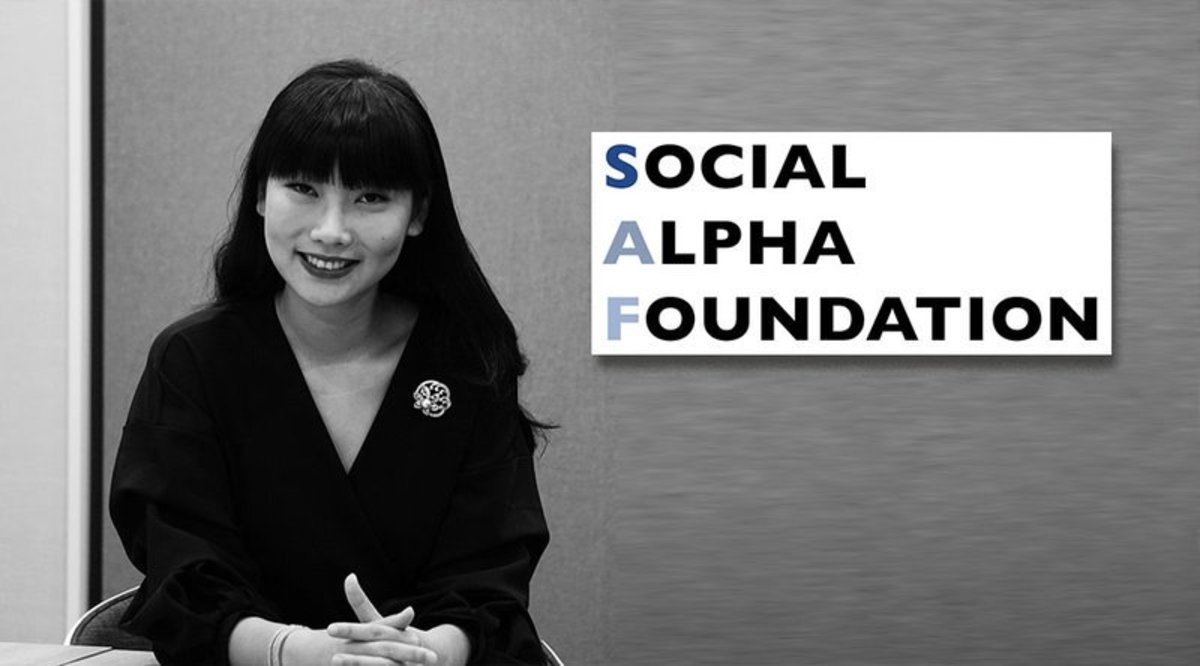
As chairman and co-founder of the Social Alpha Foundation (SAF), Nydia Zhang has left a solid mark on the blockchain and cryptocurrency space, though, as a young art student at the University of Washington in 2011, blockchain was far from the direction she saw her life taking.
Zhang earned her bachelor's degree in art history in 2015 and spent the next few years carving out a career for herself in the field of art management. After working for several museums around the world, including Pearl Lam Galleries, Seattle Art Museum and Vermillion Art Collections in Hong Kong, she ended up at the San Francisco Museum of Modern Art, where she served as a research manager and board member.
In a recent interview with Bitcoin Magazine, Zhang explained how she got involved in the blockchain arena, what started the Social Alpha Foundation, what the company’s goals are and how the blockchain stands to affect global operations in the future.
Founded in 2017 in Hong Kong, SAF is a not-for-profit, grant-making platform that seeks to support blockchain education and outreach by empowering communities to utilize blockchain technology for social good. The organization offers no-strings funding to companies and projects that educate communities on blockchain technology for social change. SAF also provides grant money to non-commercial blockchain applications that focus on improving public health, education and the environment.
Successful applicants receive funds ranging from $10,000 to $100,000, depending on the size of their projects. Grants are typically offered in cryptocurrency from individuals and commercial platforms that have executed successful token sales, creating a channel for donors to adopt corporate social responsibility practices.
Zhang first decided to get involved in the blockchain space after sensing it could assist in future philanthropic efforts.
“I felt there was a need to link forward-thinking individuals working within sectors that could have a positive impact on society with funds to bring their visions and dreams to fruition,” she explains. “This drove me to become the co-founder of SAF and to enable leaders within the field of blockchain to utilize the technology for social good.”
Interestingly, SAF was Zhang’s first venture into the blockchain community, though she says it’s been one of the most rewarding experiences of her professional career. She’s also very excited about the progress the company’s made considering it’s only a year old.
“Seeing how each Social Alpha Foundation grant is utilized to assist with social projects is a great illustration of how we’d like the ecosystem to not only exist, but to grow and advance,” she says. “To date, Social Alpha Foundation has had the privilege of awarding hundreds of thousands of dollars to grantees aiming to positively impact the space.”
Thus far, SAF has supported a total of six applicants since it first opened for business. The most recent is the Blockchain Trust Accelerator (BTA), which later created the Impact Ledger, a definitive online registry of social impact blockchain projects that spans the non-profit, public and for-profit sectors. The Impact Ledger seeks to raise awareness of such projects among key audiences like non-governmental organizations (NGOs) interested in pursuing blockchain ventures, funders exploring the blockchain, and for-profits considering the creation of blockchain projects or partnering with those in another sector.
Aside from her work with SAF, Zhang is also co-chair of the Financial Inclusion Committee, a division of the FinTech Association of Hong Kong. The organization examines new ways of utilizing blockchain technology to reach sustainable development goals (SDGs) such as lowering global poverty, inequality and environmental degradation.
Despite its power, Zhang mentions there is still heavy uncertainty surrounding blockchain technology, particularly because it’s so new. She also noted the lack of opportunities the public has had to educate itself up to this point but believes that’s slowly changing.
“Blockchain has evolved greatly over the past year,” she comments. “As someone who works within the space daily, I find the evolution of sectors in which blockchain can assist is expanding. Blockchain is moving beyond being linked to cryptocurrencies and financial aspects and into different sectors, but uncertainty remains about the development of the technology and the direction it’s heading. A concern of mine is that the lack of blockchain knowledge from beginning investors leads to speculative investing and creates a very narrow view.”
She went on to say, “Education is what I see in the future as a positive change within the blockchain space. Universities and higher educational institutions are now starting to offer classes on blockchain, and not solely from a technical perspective, but extending to the business end as well. More well-rounded education on blockchain can begin in classrooms prior to on-the-job experience, but I believe the more real-life use cases we see, the more likely companies and individuals will understand the myriad of advantages in blockchain.”
One of the other issues she’s noticed is the gender gap and lagging female presence in the blockchain arena. For the most part, it has been largely dominated by men, though she says women are becoming more attracted to its job prospects and ongoing growth.
“As the blockchain industry and community are growing every day, I believe a strong demand for great talent has attracted more women to the space,” she says. “Diversifying the blockchain industry and making it more gender neutral could positively impact the space as more businesses move toward incorporating the technology into their business plans.”
Zhang says that if the blockchain industry is to achieve mainstream status, it has no choice but to submit to regulation. It may be hard at first, but this will ensure trust in the space and give blockchain and cryptocurrencies far more legitimate appearances.
“To build a healthy ecosystem, regulation is a must,” she asserts. “The industry can only thrive with support from the government and institutions. South Korea, for example, is trialing a blockchain voting system and the United Arab Emirates’ government is presenting its national blockchain initiative. This demonstrates that even the strongly centralized public sector stands to benefit from a distributed ledger system.”
In the long run, Zhang is confident the blockchain will one day be widely adopted by governments, businesses and other ventures everywhere, and that its technology will be as common as the internet.
“I do think that blockchain will be widely adopted,” she mentions. “It will become a back-end tool which offers the best solution to problems faced in a world of predominantly centralized systems. Different countries’ views on blockchain, government regulation and bad actors within the space are what stands in the way of global adoption right now, but the possibility of positive change is what sparks my desire and drive to be in the space, and I fully believe the technology will change the world.”










